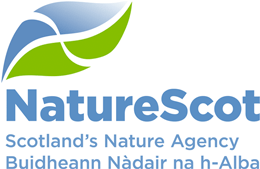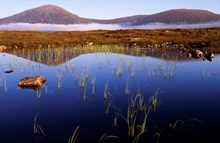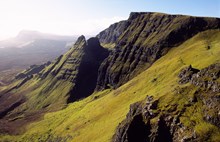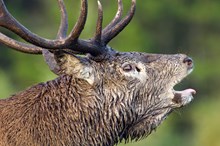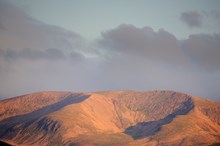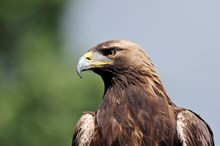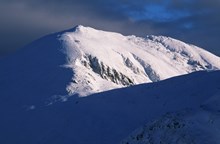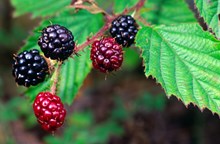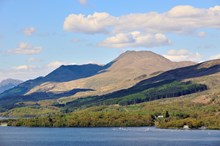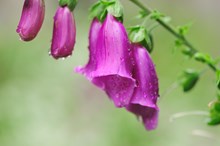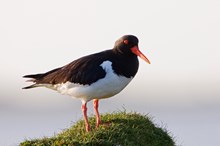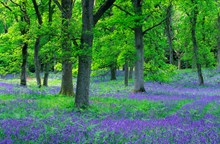18 October, 2018
15 fascinating facts: a celebration of Gaelic and Scotland's natural heritage
High resolution images available to download below
Scottish Natural Heritage (SNH) is marking this week’s Royal National Mòd with a celebration of the links between the Gaelic language, heritage and nature.
Here are 15 fascinating facts highlighting the intrinsic relationship between people, Gaelic and the landscape, animals, birds and plants of Scotland.
An robh fios agaibh…..? / Did you know…..?
There are over forty different words in Gaelic for ‘bog’. The English word ‘bog’ itself comes from Gaelic.
The poetic Gaelic name of the Isle of Skye is Eilean a’ Cheò - ‘the isle of the mist’.
The Gaelic name for October is An Dàmhair, derived from damh-dàir and meaning ‘deer roaring time’.
The Cairngorms get their English name from the Gaelic An Càrn Gorm ‘the blue mountain’ (the location of the ski resort). Their Gaelic name is Am Monadh Ruadh ‘the russet mountains’ - a commentary on the colour of the granite which dominates the range.
There are 276 Gaelic place-names in Scotland which name the iolaire ‘eagle’. Over two-thirds are thought to represent the golden eagle and the remainder the white-tailed sea eagle.
Whereas English adopted a French word ‘avalanche’, there is a native Gaelic word for the same phenomenon – maoim-sneachda ‘gushing forth of snow’ – reflecting the fact that avalanches have always been part of life in the Scottish mountains.
A Gaelic proverb says às an dris, anns an droigheann ‘out of the bramble into the blackthorn’. It’s an equivalent of ‘out of the frying pan into the fire’.
Loch Lomond was originally Loch Leamhain, named from the river that flows from it (it means ‘elm river’). It derived its modern name from Ben Lomond, in Gaelic Beinn Laomainn ‘beacon mountain’.
The mountain Lochnagar in Aberdeenshire gets its name from Lochan na Gàire ‘the lochan where the wind makes a noise’, near the summit. In Gaelic it is Beinn nan Cìochan ‘the mountain of the nipples’.
The aurora borealis is known in Gaelic as Na Fir-chlis, literally ‘the nimble men’.
The shortest place-name in the world is the one-letter Gaelic for Iona – Ì. It is often known as Eilean Ì or Ì Chaluim Chille, the latter linking it to its most famous inhabitant, Calum Cille (‘dove of the church’, St Columba).
The English names for two of our native birds come from Gaelic – ptarmigan (tàrmachan) and capercaillie (capall coille).
The foxglove is seen as a fairy plant in Gaelic tradition. Among its Gaelic names is Lus nam Ban-sìth ‘the plant of the fairy women’.
When the oystercatcher flies, it calls ‘bi glic, bi glic’, the Gaelic for ‘be wise, be wise’.
The darach or oak tree is known poetically in Gaelic as rìgh na coille ‘the king of the forest’.
SNH is involved in an extensive programme of projects to promote the use of Gaelic, boost interest in the language and secure its future as a unique and important part of life in Scotland.
Our work includes a bilingual series of booklets on Gaelic in the Landscape, celebrating the cultural and natural heritage of areas such as Skye and the North West Highlands, as well as an online Gaelic nature dictionary.
This year marks the third year of SNH’s involvement in the Royal National Mòd, with a specially commissioned concert led by acclaimed musician Mary Ann Kennedy to celebrate the Clyde. The performance, Clyde – A River Recovery, took place earlier this week as part of the Mòd fringe in Dunoon.
SNH has also recently launched a new foraging education pack and workshops for Gaelic-medium schools.
ENDS
Contact information
- Name
- NatureScot Media
- Telephone
- 0131 316 2655
- media@nature.scot
Notes to editors
MEDIA QUERIES: For more information, contact SNH Communications Officer Catriona Webster on catriona.webster@nature.scot or the main SNH press office on 0131 316 2655 or snhmedia@nature.scot.
PICTURES: Free use. Please credit SNH/Lorne Gill.
NatureScot is Scotland's nature agency. We work to enhance our natural environment in Scotland and inspire everyone to care more about it. Our priority is a nature-rich future for Scotland and an effective response to the climate emergency. For more information, visit our website at www.nature.scot or follow us on X at https://x.com/NatureScot
’S e NatureScot buidheann nàdair na h-Alba. Bidh sinn a’ neartachadh àrainneachd na h-Alba agus a’ brosnachadh dhaoine gu barrachd suim a chur ann an nàdar. Tha e mar phrìomhachas againn gum bi nàdar na h-Alba beairteach agus gun dèilig sinn gu h-èifeachdach le èiginn na gnàth-shìde. Tha an tuilleadh fiosrachaidh aig www.nature.scot no air X aig https://x.com/NatureScot
